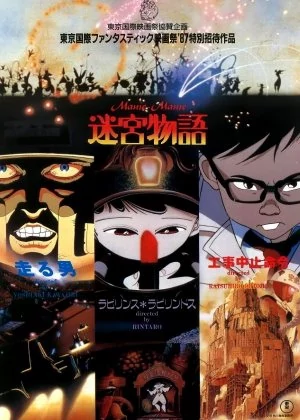Neo-Tokyo
Movie details

It's not a secret that I have a soft spot for anthology films, animation anthologies in particular are often a sparkling well of creativity. Case in point: Neo-Tokyo (also known as Meikyu Monogatari or Manie-Manie). It's a Project Team Argos and Madhouse co-production, adapting the work of Japanese sci-fi writer Taku Mayumura and bringing together a unique combination of talented directors. The result is 50 minutes of animation wonder in a project that easily withstands the test of time.
![screen capture of Neo-Tokyo [Meikyu Monogatari]](/thumbs/img/articles/1200xauto/neo-tokyo-1.webp)
The late '80 was a great time for Japanese animation. With films like Angel's Egg, Wings of Honneamise, Akira, My Neighbor Totoro, Patlabor: The Movie and Grave of the Fireflies all released in under 4 years time, it was clear that something was bolstering over there. Neo-Tokyo offered directors Yoshiaki Kawajiri, Katsuhiro Otomo, and Rintaro a chance to show the world they deserved a place in that scene.
The first of the three shorts (Labyrinth*labyrinthos) is directed by Rintaro and serves as a small introduction to the other two short films. Even though it's very light on plot, there is a basic storyline about a clock serving as a portal to a labyrinth world, discovered by a little girl and her cat while playing hide and seek. It's a rather experimental short, toying around with outlandish camera angles, novel animation techniques (there are some very limited computer animations in there), and a unique art style.
Labyrinth is not your typical anime short, then again, Rintaro is not your typical anime director. There's also a short continuation at the end of the anthology, making it a rather strange but fulfilling wrapper episode, with enough wonder and stand-out moments to warrant it a "full short" status. Just don't try to make too much sense of it, but approach it as a fever dream with a particular goal that needs to be met to kick off the other two shorts. 4.5*/5.0*
![screen capture of Neo-Tokyo [Meikyu Monogatari]](/thumbs/img/articles/1200xauto/neo-tokyo-2.webp)
The second short is called Hashiru Otoko and is directed by Yoshiaki Kawajiri. Kawajiri made a name for himself directing anime classics like Wicked City, Monster City, and Ninja Scroll, a very particular type of anime that introduced many boys in the West to the world of Japanese animation during the early 90s ( while also giving it somewhat of a bad rep over here because of the rather graphic gore and erotica that make up a huge part of these films).
Hashiru Otoko is a little different, as it focuses more on its sci-fi setting and on character development, playing like a darker and more serious version of Takeshi Koike's Redline. The film's about a legendary race car driver who eliminates his opponents with his telekinetic abilities. Things get hairy when his mind is starting to give in and he ends up racing his own mental image. While a bit cruder in style, the build-up of this short is excellent and the pay-off is more than worthy. 4.0*/5.0*
![screen capture of Neo-Tokyo [Meikyu Monogatari]](/thumbs/img/articles/1200xauto/neo-tokyo-3.webp)
The final short film (Koji Chushi Meirei) was helmed by Katsuhiro Otomo, a year before he would adapt Akira into a feature film. Still new to the field, Otomo used this chance to get acquainted with directing sci-fi material, something that would help him out when he finally got around to directing one of the biggest anime films ever made. The short tells the story of a young supervisor who is sent to shut down a self-sufficient plant in the middle of the rainforest.
His job is to stop the robots from finishing the plant as they're burning through raw materials, but that's easier said than done since the robots are programmed to deliver the plant on time. It's a cute little short, bristling with small details, crazy animation (Koji Morimoto was on the team as a key animator), and quirky ideas. It's not as serious as Otomo's other films, but there's a clear underlying message about AI and robotics that has been gaining traction again in the past few years (now that we're actually nearing technology like the one displayed in this short). 4.5*/5.0*
Neo-Tokyo (together with Robot Carnival, another 1987 anthology sporting promising names) helped to pave the way for a respectable stream of animated anthology films coming out of Japan. Every few years a couple of directors come together to give the best of themselves, enjoying the freedom to make something that doesn't necessarily need to meet customer demands. They use this freedom remarkably well, which is why these types of films continue to pop up in my list of favorites. If you're into animation, Neo-Tokyo is a definite recommendation. The film has clearly aged, but the animation is still impressive and there's enough left to wow you into liking it.